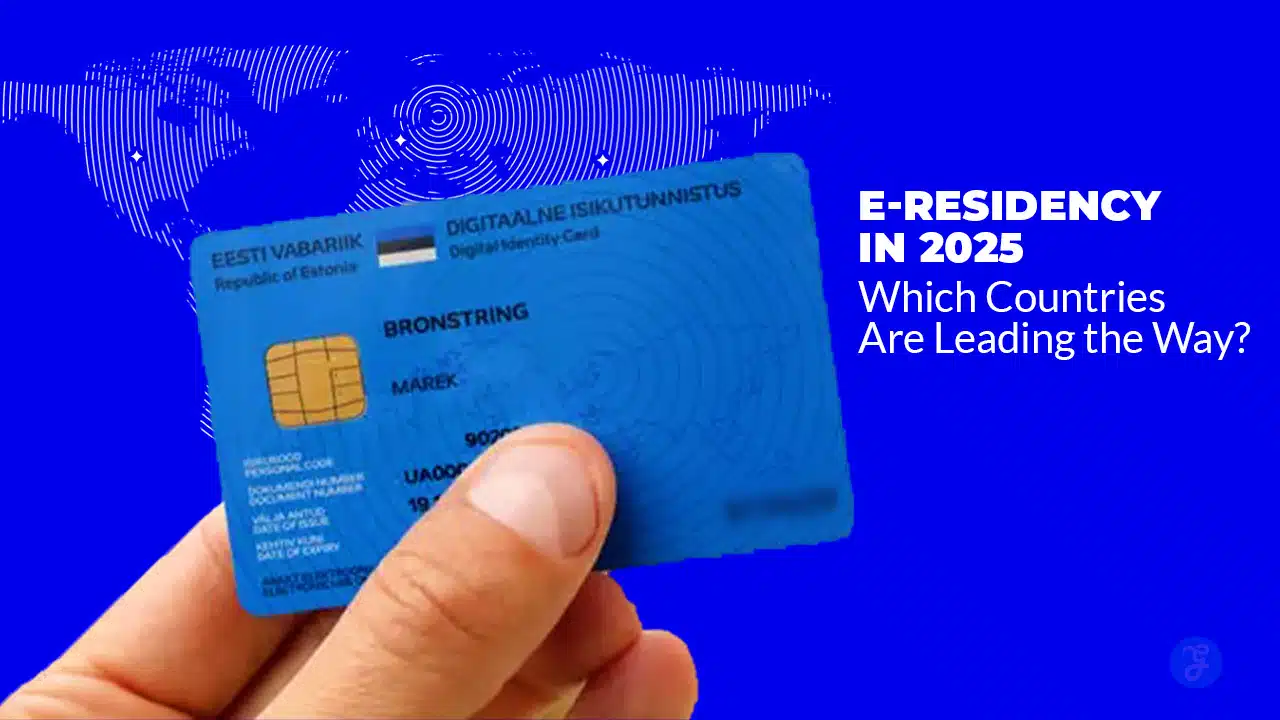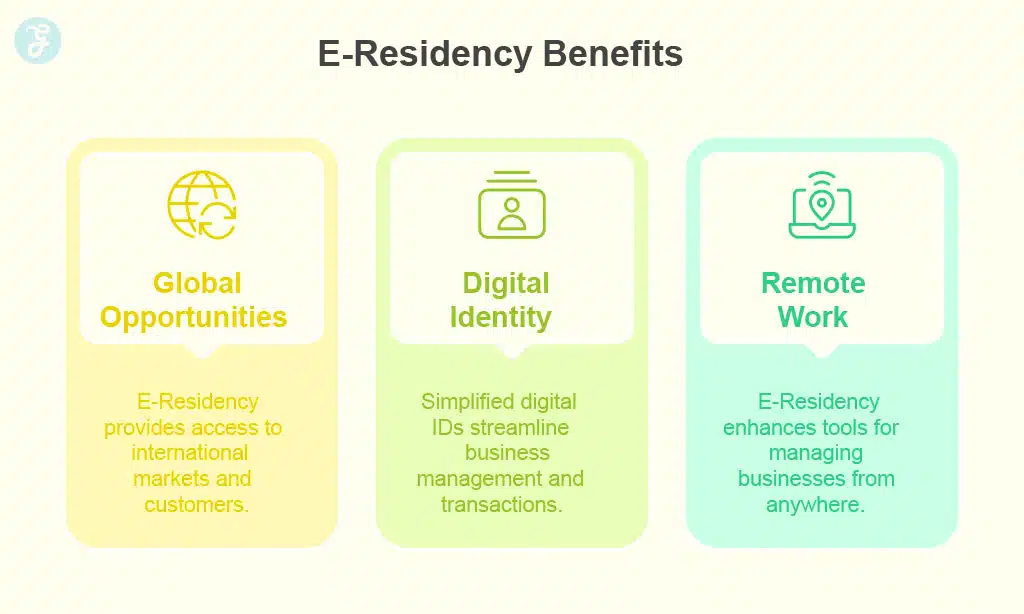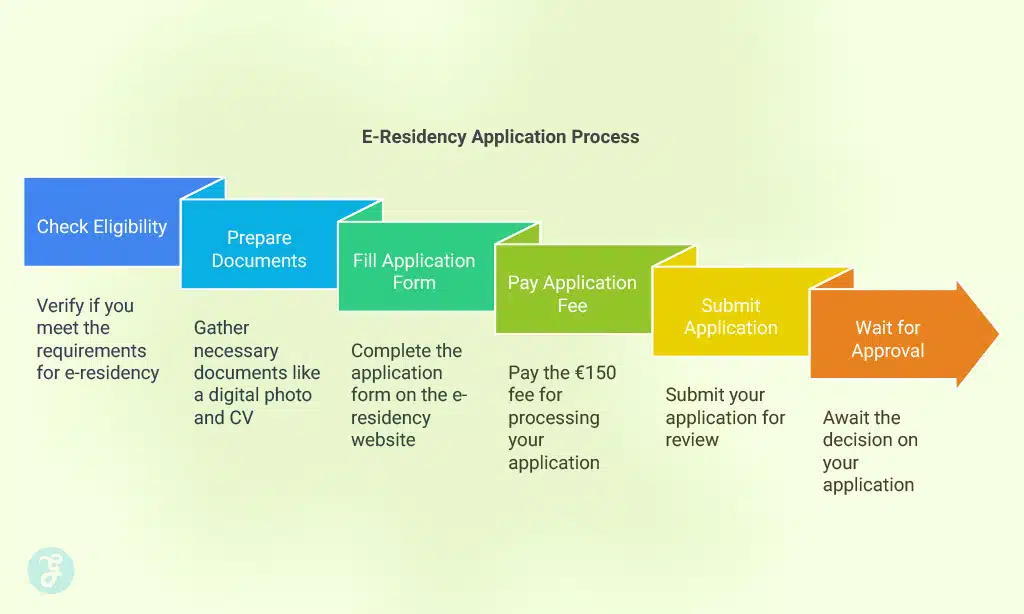Starting a business can be tough, especially if you’re a digital nomad or an entrepreneur looking for global opportunities. You might be asking how to manage your online business from anywhere in the world.
Here’s something interesting: E-Residency could be your answer.
Estonia started the first e-Residency program in 2014. This lets people start and run a digital business in Estonia, no matter where they live. Our blog will show you which countries are now leading in offering these kinds of services by 2025, and how these programs can help digital entrepreneurs like you.
You’ll learn about new tech that makes e-Residency even better and why this matters for economic growth around the world. Keep reading to find out more.
What is E-Residency?
E-Residency is a digital identity given by the government. It started in Estonia on December 1, 2014. This lets people manage a business online from anywhere. You don’t get to move or live there; just do business.
With e-Residency, you can sign documents and open a company without going there.
E-Residency opens the world for digital nomads and remote entrepreneurs.
Key Benefits of E-Residency
E-Residency opens doors to the business world from anywhere. It makes handling company tasks online simple and secure.
Access to global business opportunities
E-Residency programs like Estonia’s open big doors for people all over the world. With over 100,000 global e-residents, it shows how digital residency can make business easier. Now, folks from different places can start a company in Estonia without physically being there.
This means they get to be part of the European Union’s market. It’s not just about Europe. These e-residents can reach customers everywhere.
Countries such as Lithuania and Portugal are also getting into e-Residency. They offer services that help people manage their work online better. For example, Lithuania helps with accessing administrative services easily while Portugal makes public services available to those living outside its borders.
This means if someone wants to start a new tech firm or sell goods across borders, these countries have made it simpler than ever before.
Simplified digital identity solutions
Simplified digital identity solutions make managing businesses easier. Governments give a digital ID for this. With it, people can do bank work, sign documents, and file taxes online.
This makes things faster and safer.
Countries like Estonia offer these IDs to help people from anywhere manage their work without travel. They use technology like blockchain for secure IDs. This means less trouble when doing business across borders.
Enhanced remote work capabilities
After making digital identities easier, e-residency programs also make working from anywhere in the world simpler. These programs offer remote business management tools that let people run their companies online.
They can sign documents digitally and handle taxes through the internet.
Estonia is a leader in this area. It has over 100,000 e-residents who use these services to manage their businesses from any place with an internet connection. People thrive by using smart cards for online transactions, which boost tax efficiency and global operations.
E-Residency provides the freedom to easily start and manage a global business.
Leading Countries in E-Residency Programs in 2025
Countries like Estonia, Lithuania, Ukraine, Portugal, and Singapore are at the forefront in offering e-residency programs by 2025. They provide digital services and opportunities for people around the world to start and manage global businesses online.
Dive deeper into what each of these nations offers for e-residents.
Estonia
Estonia started its e-residency program in 2014. It was a big step for the country. Now, it has over 100,000 e-residents from around the world. The program lets people start and run global businesses online.
They can do this from anywhere. Estonia offers services like access to online banking, digital document signing, and tax filing.
People choose Estonia’s e-residency because of its ease and benefits. For example, you can set up a private limited company without being there. This makes Estonia attractive to entrepreneurs everywhere.
The country uses advanced tech to make everything smooth and secure for its users.
Lithuania
Lithuania started its e-residency program in 2021. This program lets people access government online services easily. It helps with digital IDs and managing businesses from far away.
But, it does not let you live or visit Lithuania just because you join.
Lithuania’s e-residency offers a gateway to Europe for global entrepreneurs.
Next, we will look into Ukraine’s role in the world of e-residency and how they are opening doors for business owners everywhere.
Ukraine
Ukraine started its e-residency program, called uResidency, on October 1, 2024. They want to draw in people from countries like India and Thailand. Their goal is to make $1 million in taxes from 1,000 e-residents in the first year.
The tax for these residents is low. It’s 5% on income up to €180,000 and goes up to 15% if they make more.
This move by Ukraine makes it easier for folks abroad to start businesses there without moving. People can handle their work online and join Ukraine’s digital economy. This helps Ukraine grow while offering new chances for global entrepreneurs.
Portugal
Portugal started its e-Residency program in 2020. This program gives digital identities to people who are not living in Portugal. With this, they get a Tax Identification Number (NIF) and Social Security Identification Number (NISS).
The cost to apply for this can be from $90 to $299. People all over the world find it useful. They can do business in Portugal without moving there.
The country’s e-Residency helps many people join the global market. It makes things easier for those who work online or run startups. In Portugal, you don’t just get an ID; you also become part of a growing community of digital workers and entrepreneurs.
This has made it a popular choice among Portuguese-speaking countries and others looking for new opportunities abroad.
Singapore
Singapore stands out for its e-residency programs. The city-state offers easy access to the booming Asian markets. With a strong focus on digital transformation, Singapore helps global startups and entrepreneurs set up their businesses smoothly.
Financial inclusion is a key part of Singapore’s plan. This means it makes sure people can use banking and financial services easily.
The government uses advanced tech like blockchain for secure digital IDs. This makes doing business safer and cuts down on fraud. Singapore also supports remote work, letting people live anywhere and still run their companies in Singapore.
Singapore is at the forefront of redefining global business through its innovative e-residency program.
This approach boosts the economy by attracting investors from around the world. They come to enjoy benefits like tax exemptions and access to a skilled workforce without needing a traditional work permit or residency visa.
Countries like Azerbaijan, South Africa, Brazil, and Georgia are planning an e-residency program. They will launch the e-residency program soon.
Innovations in E-Residency Technology
In e-residency technology, new tools like blockchain for digital IDs and AI for paperwork are making things safer and smarter. These changes help people work from any place in the world with just an internet connection.
Check out how these innovations could shape the future of global business.
Blockchain-based digital IDs
Blockchain-based digital IDs make security better. They help keep e-residents safe from identity theft. This technology makes it easy to check who someone is online. It cuts down on fraud.
Countries use blockchain to help their e-residency programs work better.
This system lets e-residents do business all over the world safely. They can sign papers and open bank accounts without worry. Blockchain keeps their private information secure. It uses codes that are hard to break.
So, people trust these digital IDs more and more.
AI-enhanced administrative processes
AI is changing how countries handle paperwork and legal tasks. It makes things faster and less complicated for people who want to start businesses or move money around the world. Think of it like having a smart assistant that can read through thousands of documents in minutes, find mistakes, and even suggest better ways to do things.
Countries are using AI to speed up background checks, process applications for e-residency, and make sure everything follows the law. This means if you’re applying from anywhere in the world, your application can be checked quickly, making the whole process smoother.
AI makes global business easier by automating complex processes.
Now let’s talk about how secure virtual banking solutions are keeping your money safe while doing business internationally.
Secure virtual banking solutions
Moving from AI-enhanced administration, we now focus on secure virtual banking solutions. These tools help people and businesses handle money online safely. Banks use strong security measures to protect your information.
They check who you are in many ways before letting you access your account.
For example, some banks send a code to your phone that you must enter on their website. This process is called two-factor authentication. It adds an extra step but keeps your account safer.
Banks also use encryption to scramble data. This means when you send information online, like a payment or personal details, it’s turned into a code that only the bank can read.
These steps make sure that only you can get into your bank account and keep hackers out.
E-Residency and Economic Growth
E-Residency programs fuel economic expansion by making it easier for businesses to start and grow. They draw investors and entrepreneurs from around the world, creating new jobs and boosting local markets.
Boosting entrepreneurship
E-residency helps people start businesses easier. It opens doors to global markets. This is big news for entrepreneurs everywhere. Think about it—2,450 new Estonian companies came to life in just six months because of e-residents.
These businesses added over €11 million a year to Estonia’s economy. That’s a lot of money from folks who might not even step foot in Estonia.
Now, imagine being able to do business anywhere with just your laptop and internet. E-residency breaks down old barriers. You don’t have to move or deal with tough paperwork. It’s like having a golden visa for the digital world, but better because you help build the future economy too.
Next up, let’s discuss how this affects global startups.
Supporting global startups
E-residency makes it easy for startups around the world. From January to June 2024, e-residents made 2,450 new companies. This shows how e-residency helps people start businesses easily.
Startups can work from anywhere and still reach customers across the globe.
This program also puts more money into Estonia’s budget. In the first half of 2024, it added €31 million. So, e-residency not only supports startups but also helps Estonia’s economy grow.
Now let’s see what problems come with e-residency.
Challenges and Limitations of E-Residency in 2025
E-Residency faces some tough hurdles, like keeping digital spaces safe. Access to these programs isn’t easy for everyone, either.
Digital security concerns
Digital security is a big worry for e-residency. Estonia uses blockchain to keep data safe for people who are e-residents. This technology helps protect their digital signatures and identity cards from hackers.
But, not all countries use such strong methods yet.
People are also worried about privacy with these programs. They fear their personal information might get stolen or misused online. Cybersecurity measures need to be strong to stop this from happening.
Making sure everyone’s data stays private is important in keeping trust in these programs.
Limited program accessibility
E-Residency programs are not open to everyone. Some countries have set rules that make it hard for people from certain places to apply. For example, Estonia has new limits on who can ask for e-residency.
Now, people from these restricted areas can only renew their e-residency if they help Estonia’s economy grow.
Even if you already have an e-resident digital ID, it will stop working when it reaches its end date if you’re from one of the restricted countries. This means not all business people around the world can use these programs to start or grow their companies overseas easily.
Future Trends in E-Residency
E-Residency programs will grow around the world. They will use new tech like blockchain and AI to make things better.
Expansion of global programs
Countries all over the world are starting to offer e-residency. This makes it easy for people to do business from anywhere. For example, Portugal and Lithuania recently launched their own versions.
These countries join others like South Africa, Georgia, and Brazil that already have such programs. E-residency lets entrepreneurs, freelancers, and digital nomads run a company online without needing to move.
This trend is growing fast. More countries plan to start their own e-residency programs soon. They see how these programs help the economy by attracting business owners from around the globe.
Also, these programs make it easier for people to access services they need for work. This means in the future, more people can work from anywhere they choose without big problems.
Integration with decentralized technologies
E-Residency programs are now using blockchain. This tech makes digital IDs safe and clear. It also helps stop people from stealing identities of e-residents. With blockchain, businesses can trust e-residency more.
They know everything is open and nothing is hidden.
This tech goes well with other tools like QR codes for quick checks and biometric data for a safer login. Together, they make e-residency services better for users around the world.
Blockchain keeps your info safe and lets you do business easier across borders.
How to Apply for E-Residency
Applying for e-residency is straightforward. First, check if you meet the rules to join. Then, fill out the form online to start using the services.
Understand eligibility requirements
To start applying for e-residency, you need a few things. First, have a valid passport or any government ID. This shows who you are. You also need a digital photo of yourself. Make sure it’s recent and clear.
Next, write down why you want e-residency. This is your statement of motives. It helps the program see how serious you are about joining.
Last, get ready to pay an application fee. This fee covers the cost of checking your info and setting up your e-residency. The whole process takes between 4 to 8 weeks from when they get your application until they tell you if you’re in or not.
These steps make sure only serious people apply. They keep the program safe for everyone.
Complete the application process
First, check if you meet all the needs to apply. You will need a digital photo of your passport and a copy of your travel document. Also, write why you want e-residency and add your CV.
This step shows countries like Estonia or Portugal that you are serious about joining their digital nation.
Next, fill out the form on the e-residency website. It takes about 30 minutes. Make sure everything is correct before sending it in. The fee for applying is €150. Once done, they will look at your application within 30 days.
After submitting, wait for their email. If they say yes, you get a digital ID card good for five years. This card lets you do business online just like someone living in that country.
Access e-residency services
Getting your e-residency services starts after applying. You will get a digital ID card. This card lets you start a company online in the European Union (EU). It’s fast and takes 1-2 days.
Over 120,000 people from more than 170 countries have done this. Their companies made €15 billion together.
This service opens global business doors for entrepreneurs. With it, you can manage your business from anywhere. Next, learn about innovations in e-residency technology that make things even better for users.
Takeaways
E-Residency opens doors worldwide. Countries like Estonia, Lithuania, and Singapore are leading. They offer easy ways to handle business from anywhere. New tech makes this safer and simpler every day.
This path lights the way for future global entrepreneurs.
References
- https://www.researchgate.net/publication/358812544_ESTONIAN_E-RESIDENCY_AND_CONCEPTIONS_OF_PLATFORM-BASED_STATE-INDIVIDUAL_RELATIONSHIP (2024-10-22)
- https://blog.xolo.io/ultimate-list-of-e-residency-countries
- https://www.researchgate.net/publication/363547612_The_estonian_e-residency_programme_and_its_role_beyond_the_country%27s_digital_public_sector_ecosystem (2024-10-22)
- https://www.globalpassport.ai/blog/the-ultimate-guide-to-e-residencies
- https://kyivindependent.com/ukraine-business-roundup-ukraine-launches-e-residency-for-foreigners/
- https://www.theblogler.com/e-residency-program-countries/ (2023-10-17)
- https://www.sciencedirect.com/science/article/am/pii/S0267364917300845
- https://www.beyondencryption.com/blog/countries-most-innovative-digital-id-systems
- https://www.e-resident.gov.ee/blog/posts/e-residency-applications-and-company-incorporation-increased-7-in-first-half-of-2024/
- https://www.sciencedirect.com/science/article/abs/pii/S0267364917300845
- https://www.e-resident.gov.ee/blog/posts/changes-to-e-residency-in-2025-and-beyond/ (2024-10-22)
- https://www.researchgate.net/publication/316753727_E-residency_and_blockchain
- https://www.e-resident.gov.ee/blog/posts/how-to-apply-for-e-residency/
- https://www.e-resident.gov.ee/








































